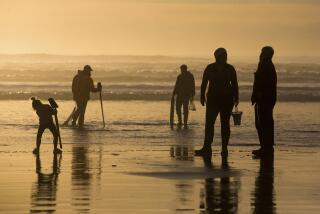Coast Guard Casts a High Profile in Bid to Net Crab Raiders
- Share via
SEATTLE — Fishermen say higher profile Coast Guard patrols near the U.S.-Canadian border and several arrests appear to be deterring illegal fishing in state waters.
The “crab raids” by Canada-based vessels that have inflamed Washington fishermen near Blaine and Bellingham are either falling off or being pulled off without detection, said Dirk Visser, president of the Inner Sound Crab Assn.
“The enforcement situation is much better now,” he said. “We haven’t had much help in the past few years. The most notable reason for the improvement is the Coast Guard. They have a higher profile here this year.”
Visser added that state fisheries personnel and covert surveillance by National Marine Fisheries agents have helped curb fishing violations.
Confrontation Zone
Crabbers, gill netters and bottom fishermen have complained loudly in recent years about illegal fishing by foreign fishing vessels in U.S. waters near Boundary Bay, the San Juan Islands and the Strait of Juan de Fuca.
The Boundary Bay area, rich in crab beds, became a confrontation zone between Washington crabbers and foreign fishermen who slipped across the international border at night to set unmarked lines of crab pots.
Washington fishermen, who complained the Coast Guard had not done enough to catch and stop violators, began locating and hauling in illegally set traps by the score. More than 3,500 traps are rusting in stacks in a Blaine storage yard along Interstate 5.
“Most of them wouldn’t even allow young crabs to escape,” said Visser, explaining that regulations mandate traps designed to allow smaller, immature crabs to crawl out of the traps in order to maintain breeding populations.
Rogue crabbers from Canada attached crab pots to long lines and submerged them without surface markers. Special navigation equipment was used to determine the locations of the traps and haul them in during the hours of darkness.
Visser said proceedings are under way to confiscate the traps.
“We don’t want them back out in the water,” he said.
Patrols Increased
Visser and Rep. Al Swift (D-Wash.), believe stepped-up fisheries and drug interdiction patrols by the Coast Guard have cut illegal fishing and crabbing.
Swift, who represents the northwest Washington area, interceded with Coast Guard officials in Washington, D.C., and Seattle to step up patrols.
“We talked to some of the folks in the Coast Guard about deploying a cutter to the Blaine area because of all the problems with illegal crabbers,” said Shawn Hansen, an assistant to Swift who worked on the fisheries problem.
Visser said the pressure from Swift had some effect. So did an increase in the Coast Guard’s patrol budget for fiscal 1989, said Roy Compton, Coast Guard spokesman in Seattle.
A $103-million boost in this fiscal year has enabled the service to increase the number of patrols along the international boundary.
“In fiscal year 1988 we had to cut our routine patrols down to 55% of normal because of budget reductions,” he said. “This year, we’re patrolling at a higher level.
“Fishermen are aware of that. Our patrols are up to 100% of what we asked for this year, and that is a deterrent to would-be violators.”
Roy Willis, staff director of the House Coast Guard and Navigation subcommittee, said much of the additional funding going into patrol activities has been earmarked for drug interdiction.
“But these are multimission patrols, we know that,” he said. “If it’s helping fisheries conservation, so much the better.”
Willis said the $2.22-billion Coast Guard budget request for fiscal 1990 contains another $119 million in additional operating funds, much of it proposed for Coast Guard drug and fisheries patrol. He did not have a breakdown for the 13th District based in Seattle.
Fishermen also said several arrests in the last few months and impounding of boats and fishing gear have stung would-be violators.
Three Sentenced
Three Vietnamese caught by a Coast Guard patrol following a night chase from Washington waters into Canada in Boundary Bay were sentenced to jail and fined last month by a U.S. magistrate in Bellingham.
The three rammed their 25-foot aluminum boat into a small Coast Guard craft that quietly approached in the dark on Aug. 10 and caught the three men with illegal lines in the water. During the chase, a Coast Guard petty officer leaped aboard the fleeing craft and forced the men to stop.
Earlier the same month, crews aboard two vessels were caught illegally fishing in U.S. waters near the western end of the Strait of Juan de Fuca. The boats were taken to Port Angeles and the illegally caught salmon were confiscated.
The Coast Guard reported at least five incidents in which violators were arrested and boats taken into custody. Some followed chases in the state’s northern waters or in the Strait of Juan de Fuca.
“There were several seizures last year and an awful lot of fisheries patrols done by area commands,” said Compton, explaining that “area command” vessels range over wide areas of ocean. “They happened to make a lot of stops in the 13th District,” Compton added.
Coast Guard officials concede they received many calls from fishermen angry over illegal fishing by foreign crews and vessels, particularly in the inland crabbing waters near the border.
More to Read
Sign up for Essential California
The most important California stories and recommendations in your inbox every morning.
You may occasionally receive promotional content from the Los Angeles Times.













